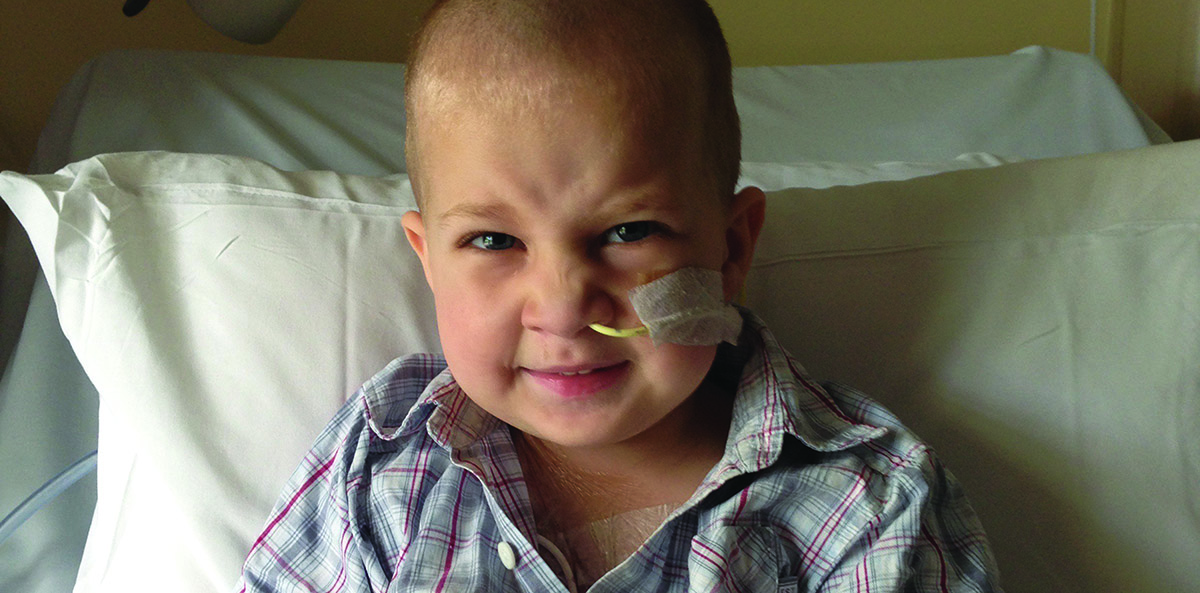We were told Fred had an 80% chance of survival and we clung to that number.
I became a mumcologist in November 2015 when my then 3.5-year-old, Fred, was having intermittent vomiting and headaches over four weeks. Within three hours of presenting at Sydney Children’s Hospital Westmead ED, he had been assessed and had a CT scan that showed a large mass in his brain.
Fred needed urgent surgery and we were told of the many risks, including the possibility of cerebellar mutism. This was mentioned only in the context of possibly becoming mute for an undetermined period and there was no mention of not being able to swallow or ataxia.
By Thursday, he had had surgery for seven hours. When the neurosurgeon emerged, she said it was a beast of a tumour, but she thought they got all of it. Fred was in PICU for three days.
Post-surgery, he couldn’t walk and when he did speak his voice was profoundly different and hard to understand. Fred also couldn’t swallow anything, but he did retain an interest in food; he would chew it and then spit into a cup.
After some weeks we had the official cancer diagnosis – desmoplastic nodular medulloblastoma subtype SHH. We were told Fred had an 80% chance of survival and we clung to that number; it was a good number. Due to his age, Fred started a chemo-only protocol before Christmas and despite neutropenia, he managed to get home in time for Christmas. Fred regained his ability to walk about six weeks after surgery.
Despite working hard on swallowing with the speech therapist, Fred was still not swallowing anything. After a traumatic nasal endoscopy, he was diagnosed with vocal cord palsy; however, it was not sufficient to warrant intervention at that point. We also attempted a Video Fluoroscopy Swallowing Study (VFSS), but the very nature of the substance Fred had to try to swallow made it difficult to get a clear picture of what was happening, and it was inconclusive.
Fred turned four in hospital in May and by June he was able to ring the bell for the end of treatment. I estimate we had about 100 days as an in-patient over about six months.
After much agonising we swapped his NG for a gastrostomy peg and within days of removing the NG he was able to eat and swallow. I firmly believe the NG tube was impairing his ability to swallow and there should be further consideration around offering medulloblastoma kids a gastrostomy peg instead of an NG. It could have saved us months of heartache.
At his three-monthly MRI in January 2017, a 6mm anomaly was spotted in the Sylvan Fissure – Fred had relapsed. He had a new central line put in and 30 sessions of high-dose craniospinal radiation with a boost to the relapse point and original tumour bed over six weeks. Every session required a general anaesthetic. I estimate Fred has had well over 50 GAs over the past five years. Fred caught a central line infection during his radiation and was an in-patient for his fifth birthday, eventually requiring acidulation of his central line.

His post-treatment MRI showed no evidence of disease and we live scan to scan. Fred suffered from extreme fatigue through 2017. He started school in 2018 and it was a tough adjustment for him, having missed so much pre-school. As predicted, the endocrinologist confirmed Fred’s endocrine system has been affected by the radiation and he now has daily growth hormone shots and thyroxine.
We had to request speech and neurocognitive assessments, which confirmed that Fred has a variety of cognitive and speech impairments. Fred sees OT weekly, speech therapy fortnightly, has a behaviour management plan and sees endo and oncology twice a year. He has also been diagnosed with a unilateral hearing loss and has finally qualified for NDIS support.
We have never seen Fred as a warrior or even brave. Being brave implies a choice and Fred had no choice in this – he has endured a lot. We will continue to fight for him, fight to get the support he needs and fight to make it easier for those who come after us.


